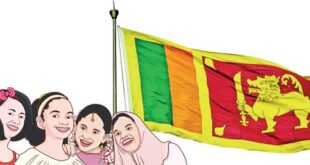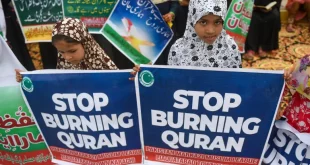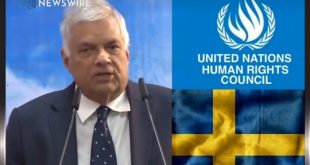The history of any country is replete with lessons that help it to shape a better future. But not Haiti’s. To use a cliché, its history is a history that repeats itself. Military coups are a common occurrence. Poverty is a perpetual enemy which is yet to be defeated. Social ills such as corruption, prostitution, armed gangsterism and narcotics have become institutionalized cancer.
In addition to these problems, the country is prone to natural disasters. Hurricanes in the Atlantic hardly leave without taking along with them thousands of Haitian lives.
As though these regular hurricanes were not enough, the earth convulsed beneath Haiti on January 12, killing more than 200,000 Haitians in what is regarded as one of modern history’s ten worst natural disasters.
About 700 Sri Lankan soldiers are in that country, serving the United Nations Stabilization Mission in Haiti (MINUSTAH). A few of them were injured in the earthquake. Why they are there is part of Haiti’s troubled history. They are there to maintain order after political chaos that bore a superpower signature. The present political order in Haiti, an apparently Washington-imposed one, seems to be working on the surface. But beneath the surface, a crisis is simmering, like the earth’s crust prior to the January 12 catastrophe. The reason: the people feel the US-backed government has not freed them from the yoke of poverty, deprivation and exploitation.
The most pressing social problem in Haiti is the huge rich-poor gap between the impoverished Creole-speaking black majority and the French-speaking elite. It is said that half the country’s wealth is controlled by the French-speaking minority, which comprises just one percent of the population.
Another problem which did not get buried in the rubble of the earthquake is the opposition to the presence of the UN troops. The resentment is evident among nationalist Haitians. But President Rene Preval says it is the criminals who thrive on anarchy who want the UN troops out.
Haitians are proud of their nationalistic past. They made world history when they became the first African slaves to fight and win independence from white colonialists.
European colonialists came to know about the land that is now called Haiti after Christopher Columbus landed on an Atlantic island in 1492. He named it Hispaniola or Little Spain. Four years after Columbus’ discovery, Spain established its first settlement there. In 1697, rivalry between European powers saw Spain giving up control of the island to France. The French made the island one of their most productive colonies. Today Hispaniola is shared by two countries — Haiti in the west and the Dominican Republic in the east.
 Not many books have been written or films made in Hollywood about how Haiti won its independence or how France lost its island jewel, which was the envy of other European powers at the time. It was the burning spirit of independence that led to the African slaves to rise up against their colonialist masters. The French Revolution and the American Revolution inspired the bitterly-oppressed African slaves to rally around a legendary guerrilla leader, Toussaint Louverture, to oppose the white man who had captured them in Africa, shipped them to America, labelled them slaves, condemned the men among them to hard labour and used their women as sex slaves.
Not many books have been written or films made in Hollywood about how Haiti won its independence or how France lost its island jewel, which was the envy of other European powers at the time. It was the burning spirit of independence that led to the African slaves to rise up against their colonialist masters. The French Revolution and the American Revolution inspired the bitterly-oppressed African slaves to rally around a legendary guerrilla leader, Toussaint Louverture, to oppose the white man who had captured them in Africa, shipped them to America, labelled them slaves, condemned the men among them to hard labour and used their women as sex slaves.
In 1801, the Haitian hero defeated the French and the British, abolished slavery and proclaimed himself governor-general of an autonomous government that ruled all of Hispaniola. He was a visionary leader and was magnanimous in victory. However, his reign lasted only for two years. He lost the eastern part of Hispaniola to Napoleon Bonaparte’s French troops and was forced to quit. Eventually he was captured and sent to a prison in France where he died in 1803. Unable to rule over a freedom-loving people, France granted independence to Haiti in 1804, but not before it fleeced the Haitians to the tune of 150 million francs — money it wanted as war reparation. Haiti is still suffering the consequence of this huge wealth loss at the time of independence. It was too revolting for the white racist colonialists to see a black nation rising as an independent state. Napoleon said that the recognition of the freedom of the Haitian slaves would be a “rallying point for freedom-seekers of the New World.”
The black rule in Haiti was a matter of concern also in the United States, which feared that it would inspire the blacks in America to fight for their rights. Since independence, no major powers came to the rescue of Haiti’s floundering economy. Haiti was left to rot in self-rule and it was cited as a lesson for the blacks elsewhere that they would also end up in utter misery if they rebelled like the Haitians. For 64 years, the US had refused to recognize the world’s first black republic.
Trouble brewed within years of independence. Haiti’s first ’emperor’ Jean-Jacques Dessalines was assassinated. Soon the country was in the hands of the Europeanized ‘mulatto’ (people of mixed black and white descent) elite, who for a short period disenfranchised the blacks.
The prolonged political crisis saw the United States invading Haiti in 1915 largely to protect its business investments. It withdrew from Haiti in 1934, but only after creating a military and police force loyal to the US in a bid to safeguard US economic interests, especially the plantations.
The post-World War II world order brought Haiti’s economy under World Bank and IMF supervision. This saw the country plunging deeper into the abyss. In 1956, a mass-scale public uprising was preempted by a military coup led by Francois “Papa Doc” Duvalier, a Voodoo doctor. A terror-incarnate, he had the support of the United States. When the dictator died after his 15-year rule, his 19-year-old son, Jean Claude “Baby-Doc” Duvalier, became president. Like his father, he too declared himself president for life.
When people’s resentment of his dictatorship reached a boiling point in 1986, the military intervened again. Baby Doc left for the United States in a US cargo plane.
People’s democracy returned to Haiti only in1990 when liberation theologian and social justice priest Jean-Bertrand Aristide was elected as president in a landslide victory. In his inauguration speech, he renounced his US$10,000 a month salary as a “scandal in a country where people cannot eat.”
If the US detested Haitian self rule in 1800s for racist reasons, this time around its dislike was largely political and econonic. It did not want another socialist state in its backyard. Thus it was no surprise when Aristide earned the wrath of the Haitian elite and their capitalist masters in the United States. The then US president George H. Bush described Aristide as an unwanted and potentially dangerous radical. The dislike was perhaps because by that time, Haiti had become the US capitalists’ biggest sweatshop where they made products for the US market, using cheap Haitian labour.
With the intention of ousting Aristide, rightwing elements financed a gangster rebellion inviting a military coup in 1991. But the US and the Haitian rightwing did not anticipate the hostile reaction from the rest of the world. The hostile reaction was largely because the coup took place at a time when European nations had made human rights and democracy conditions for better relations. The US was forced to go along with the rest of the world while the UN imposed sanctions on Haiti. The crisis saw US troops returning to Haiti and helping to set up an interim government. Aristide returned to Haiti in 1994 and led his party to victory in the parliamentary election. He won the 2000 presidential election and survived a couple of coup attempts.
However, in 2004, when Haiti was celebrating its 200th independence anniversary, rightwing rebels seized power, making it the 13th coup in the country’s history, forcing Aristide to go into exile once again and the US and the UN to intervene. Reports said the rebellion was funded by the US-based International Republican Institute. They also said that it was men in US uniforms that raided the presidential residence and forced Aristide at gunpoint to leave the country. In elections held in 2006, former Aristide ally Rene Preval was elected president. He apparently knows that politics in Haiti is the survival of those who not only placate or please the military but also the US.
The January 12 earthquake has brought in some 4,000 US troops to the familiar ground once again. This time, they are there on a humanitarian mission. The Obama administration has named two former presidents, Bill Clinton and George W. Bush, to head the fund-raising campaign for relief and reconstruction work in Haiti. But what irony it is. The two presidents who were among those responsible for battering Haiti have now been asked to save it.
 Sri lanka Muslims Web Portal Diversity and Inclusiveness
Sri lanka Muslims Web Portal Diversity and Inclusiveness



